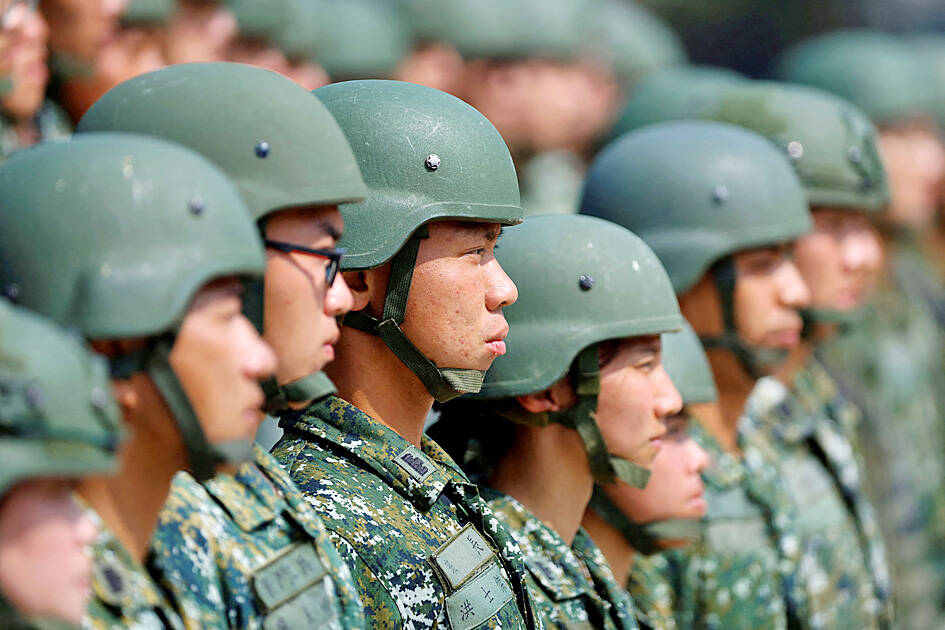Residents from Hong Kong and Macau might soon be able to register as volunteer soldiers after living in Taiwan for 10 years under amendments proposed by the Ministry of National Defense.
The Act of Military Service for Volunteer Enlisted Soldiers (志願士兵服役條例) currently requires people from China and the two territories to have a household registration in Taiwan for at least 20 years before they can enroll as a volunteer soldier.
The changes would halve the requirement for people from Hong Kong and Macau, while keeping it the same for residents originally from China.

Photo: Reuters
The time period was selected considering language in the Laws and Regulations Regarding Hong Kong and Macau Affairs (香港澳門關係條例), the ministry said.
Under the law, residents from the territories are barred from registering as candidates for public office, serving in the military or organizing political parties if they have not maintained a household residence for 10 years.
The amendment would also remove the phrase “physical weakness” from the criteria for being retired from active duty, the ministry said, citing imprecise language.
If removed, it would leave “illness and injury” as criteria for retirement.
In other news, former chief of the general staff Lee Hsi-min (李喜明) on Friday said that Taiwan should overhaul its reservist training system to create a more effective military reserve force, rather than maintaining one that is large, but “not so useful.”
Although Taiwan has a 2 million-strong military reserve force, it does not have sufficient equipment, weapons, or trainers for such numbers, which makes the system not particularly useful, said Lee, who served as chief of the general staff from 2017 to 2019.
One way to improve the existing reservist system is to adopt Singapore’s method of requiring reservists to undergo monthly training conducted over one weekend, in addition to having them attend a 14-day annual training program, the review said.
A highly mobile and well-trained reserve force would help to alleviate pressure on the military when trying to maintain a sizable regular force, but to achieve that goal would require reforms to be implemented, Lee said.
He recommended introducing an all-voluntary reserve force system and having volunteers attend a special forces training program, in addition to equipping them with portable weapons such as suicide drones or shoulder-mounted Stinger and Javelin missiles.
If one out of 10 active reservists volunteered, the armed forces would have a 200,000-strong reserve force, which when dispersed across Taiwan would be a formidable deterrent, especially if they operate as guerrillas, Lee said.

Taiwan has received more than US$70 million in royalties as of the end of last year from developing the F-16V jet as countries worldwide purchase or upgrade to this popular model, government and military officials said on Saturday. Taiwan funded the development of the F-16V jet and ended up the sole investor as other countries withdrew from the program. Now the F-16V is increasingly popular and countries must pay Taiwan a percentage in royalties when they purchase new F-16V aircraft or upgrade older F-16 models. The next five years are expected to be the peak for these royalties, with Taiwan potentially earning

STAY IN YOUR LANE: As the US and Israel attack Iran, the ministry has warned China not to overstep by including Taiwanese citizens in its evacuation orders The Ministry of Foreign Affairs (MOFA) yesterday rebuked a statement by China’s embassy in Israel that it would evacuate Taiwanese holders of Chinese travel documents from Israel amid the latter’s escalating conflict with Iran. Tensions have risen across the Middle East in the wake of US and Israeli airstrikes on Iran beginning Saturday. China subsequently issued an evacuation notice for its citizens. In a news release, the Chinese embassy in Israel said holders of “Taiwan compatriot permits (台胞證)” issued to Taiwanese nationals by Chinese authorities for travel to China — could register for evacuation to Egypt. In Taipei, the ministry yesterday said Taiwan

‘LIKE-MINDED PARTNER’: Tako van Popta said it would be inappropriate to delay signing the deal with Taiwan because of China, adding he would promote the issue Canadian senators have stressed Taiwan’s importance for international trade and expressed enthusiasm for ensuring the Taiwan-Canada trade cooperation framework agreement is implemented this year. Representative to Canada Harry Tseng (曾厚仁) in an interview with the Central News Agency (CNA) said he was increasingly uneasy about Ottawa’s delays in signing the agreement, especially as Ottawa has warmed toward Beijing. There are “no negotiations left. Not only [is it] initialed, we have three versions of the text ready: English, French and Mandarin,” Tseng said. “That tells you how close we are to the final signature.” Tseng said that he hoped Canadian Prime Minister Mark Carney

POSITIVE DEVELOPMENT: Japan and the US are expected to hold in-depth discussions on Taiwan-related issues during the meeting next month, Japanese sources said The holding of a Japan-US leaders’ meeting ahead of US President Donald Trump’s visit to China is positive news for Taiwan, former Japan-Taiwan Exchange Association representative Hiroyasu Izumi said yesterday. After the Liberal Democratic Party’s landslide victory in Japan’s House of Representatives election, Japanese Prime Minister Sanae Takaichi is scheduled to visit the US next month, where she is to meet with Trump ahead of the US president’s planned visit to China from March 31 to April 2 for a meeting with Chinese President Xi Jinping (習近平). Japan and the US are expected to hold in-depth discussions on Taiwan-related issues during the